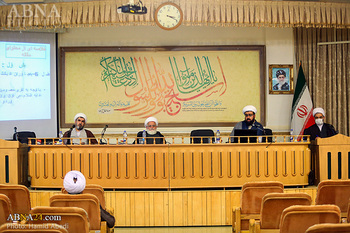The session of the “History and Life” Committee, one of the specialized committees of the International Conference of Hazrat Abu Talib (a.s.), the Supporter of the Great Prophet (p.b.u.h), was held on Tuesday evening, March 9, 2021, at the Imam Khomeini School in Qom.
The chairman of the committee was Ayatollah Muhammad Hadi Yusofi Gharavi, the judge was Hojat al-Islam Muhammad Reza Motahhari, and its secretary was Hojat al-Islam Abbas Jafari Farahani.
Researcher and religious expert, Hojat al-Islam Ali Anjum Shoaa, who had participated in the conference with the article “Hazrat Abu Talib in prayer and Ziarat, presented his article in this session.
“In compiling and analyzing this article, the ziarat of 14 infallibles and historical narrations, and a total of 40 sources have been used,” he said, stating that most of the articles written for Hazrat Abu Talib (a.s.) are about proving his faith.
“The two texts of the ziarat that exist for Abu Talib do not exist in ancient sources. But it can be understood from the narrations that the pilgrimage of Hazrat Abu Talib (a.s.) is recommended. Imam Sadegh (a.s.) likens Abu Talib to the companions of the cave (The Seven Sleepers). While the level of faith of Abu Talib is higher than the companions of the cave. The narrations that recommend the ziarat of the righteous also apply to Hazrat Abu Talib. Because Hazrat Abu Talib is the companion of the righteous and the honest,” continued the religious researcher, pointing out that there is no valid ziarat directly (from the Imams) about Hazrat Abu Talib (a.s.).
“In the ziarat texts of Imam Ali (a.s.), the name of Abu Talib is mentioned seven or eight times. This indicates that Ali (a.s.) is not only pure, but also his father was pure,” he continued.
“Because the Prophet (p.b.u.h) wept for Abu Talib, we can also weep and grieve in the ziarat of Abu Talib. It is also narrated that Abu Talib has the status of intercessor,” continued Anjum Shoaa, saying that there are eight cases in history that the Prophet (p.b.u.h) cried at the parting of Abu Talib.
“Imam Ali (a.s.) performed worship and Hajj on behalf of Abu Talib. Therefore, we can also worship on behalf of Abu Talib (a.s.),” he stated.
“Prophet Ibrahim (a.s.) prayed for his descendants, including Abu Talib, in the Quran in verse “رَبَّنَا وَاجْعَلْنَا مُسْلِمَيْنِ لَكَ وَمِنْ ذُرِّيَّتِنَا أُمَّةً مُسْلِمَةً لَكَ” ("Our Lord! make of us Muslims, bowing to Thy (Will), and of our progeny a people Muslim, bowing to Thy (will); and show us our place for the celebration of (due) rites; and turn unto us (in Mercy); for Thou art the Oft-Returning, Most Merciful) (2:128). It is narrated in history that the Prophet Muhammad (p.b.u.h) prayed for Abu Talib seven times. Therefore, we can also pray for Abu Talib. On the other hand, Hazrat Abu Talib prayed for the people,” the researcher said, regarding the subject of “Abu Talib in Prayer and Ziarat”.
“The prayer of Hazrat Abu Talib was answered by God. When there was a famine in Mecca, people asked Abu Talib to pray for rain. He prayed with the Prophet (PBUH) who was a teenager. As a result of this prayer, it rained a lot,” he continued.
Following in the meeting, Ayatollah Yousefi Gharavi stated, “Sheikh Abbas Qomi has narrated seven Ziarat for Hazrat Abu Talib, which have not been narrated from the 14 infallibles. They have been Ziarat texts quoted by Shiite figures, such as Sayed Ibn Tawus.”
“Before the Hijra of the Prophet (p.b.u.h) to Medina, people had died in disbelief and were not Muslims. Therefore, the Prophet forbade Muslims from ziarat of the graves of infidels. But when over time some Muslims died or were martyred and the Muslim cemetery was formed, the Prophet said to perform ziarat the dead,” he stated, regarding the reason for forbidding the Prophet from visiting graves in Medina.
“Sunnis accept the principle of performing ziarat of the graves and do not forbid or prohibit them. But after the Islamic Revolution of Iran, the Saudis forbade visiting graves due to enmity. Before the Islamic revolution, we were allowed to go to Baqi’ cemetery and perform ziarat,” he added.




